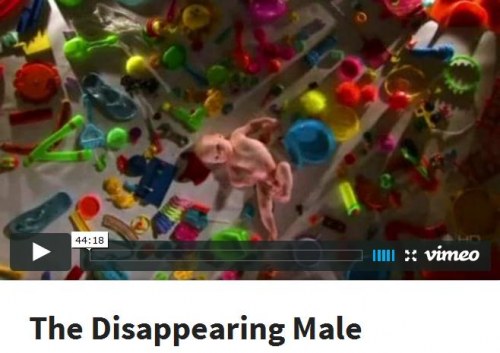 |
Declining Male Reproductive Health Linked to Xenobiotic Endocrine DisruptorsPosted: Thu, Jul 2, 2015By: Danielle Heard, MS, HHC Artemis in the City Blog Home Researchers have identified a trend in declining male reproductive health.1 This includes an increased incidence of cryptorchidism (undescended testicles), hypospadias (opening of the urethra located on the underside of the penis), testicular cancer and a reduction in the quality of sperm. Exposure to environmental chemicals, which can disrupt the endocrine system, are thought to be the cause. In fact, there are large population research studies which note a higher incidence of hypospadias and cryptorchidism in association with parental exposure to pesticides and environmental chemicals that disrupt the endocrine system. Cryptorchidism and hypospadias are the most common urogenital congenital birth defects. Research also correlates lower penile length in boys with cryptorchidism and hypospadias. Xenobiotics are chemicals which are man-made.2 They can enter the body through the skin, gastrointestinal tract and lungs. These exogenous man-made environmental chemical toxins are linked to disease when the body can’t adequately detoxify them. Each person has a unique genetic makeup, varying degrees of gastrointestinal barrier health as well as eliminative functioning which affects their ability to excrete harmful toxins. Xenobiotics include pesticides, processed food, food packaging, plastics, organotoxins and pharmaceuticals. There are 12 main hormone-altering chemicals which can negatively affect health.3 They are: Bisphenol A (BPA), Phthalates, Dioxin, Atrazine, Perchlorate, Fire Retardants - Polybrominated Diphenyl Ethers (PBDEs), Heavy Metals - Lead, Arsenic, and Mercury, Perfluorinated Chemicals (PFCs), Organophosphate Pesticides and Glycol Ethers. These hormone disruptors can increase the production of some hormones while decreasing the production of other important hormones. They can interfere with cell signaling, cause premature cellular death, compete for nutrients and can accumulate in organ tissues. Endocrine disruptors are particularly harmful to a developing fetus as cells are rapidly dividing. 4 In the documentary film, The Disappearing Male, researchers note that males across all species (humans, frogs, fish, alligators etc.) are declining and believe the decline is linked to endocrine disruptors such as phthalates and BPA.4 Males seem to be affected the most because of the effect on male reproduction. Sperm counts have been noticeably reduced. Sperm quality is also lower with higher abnormalities affecting speed and motility causing higher rates of infertility along with higher rates of genital defects. During the first 6 weeks of embryo development, it is neither male nor female. Exposure to chemical toxins in the womb can interrupt sex hormones necessary for the development of the male reproduction track. Exposure to chemicals is a likely cause for a high increase in male genital defects and the loss of developing male fetuses. Chemical endocrine disruptors are everywhere in our environment as they are used to make computers, furniture, cookware, clothes, bedding, cosmetics, toys, food packaging, medical devices, IV tubing, blood bags, catheters, DVDs, baby bottles and more. They are even in air and water. People are exposed to thousands of toxic chemicals every day which are derived from petroleum. It is very important that we all work together to reduce chemical toxins released into our environment and become more aware of the chemicals we are exposed to on a daily bases. Becoming more aware of environmental toxins, and working to minimize those in our home environment as well as our diet is very important for maintaining good health and the prevention of disease. If you would like a nutrition consultation to help you reduce your chemical toxin load, improve detoxification pathways, or to be tested for toxin exposure to identify levels of heavy metals and xenobiotics, please get in touch and schedule an appointment. I would be very happy to help you.
Watch this very informative documentary – The Disappearing Male: Click Here
Sources: 1) Thankamony A, Lek N, Carroll D, Williams M, Dunger D, Acerini C, Ong K, Hughes L. Anogenital Distance and Penile Length in Infants with Hypospadias or Cryptorchidism: Comparison with Normative Data. Environ Health Perspect. 2014 Feb; 122 (2): 207-211. doi:10.1289/ehp.1307178. http://ehp.niehs.nih.gov/1307178/#tab2. Accessed July 2, 2015. 2) Lord R, Bralley J. Laboratory Evaluations for Integrative and Functional Medicine, Revised 2nd Edition. Duluth, GA: Genova Diagnostics; 2012: 470-473. 3) Environmental Working Group. Dirty Dozen Endocrine Disruptors – 12 Hormone-Altering Chemicals and How to Avoid Them. EWG. http://www.ewg.org/research/dirty-dozen-list-endocrine-disruptors#. Accessed July 2, 2015. 4) Guerre M.The Disappearing Male. Produced by Alan Mendelsohn. Ontario, Canada: A Red Apple Entertainment Production; 2008: Top Documentary Films. http://topdocumentaryfilms.com/the-disappearing-male/. Accessed July 2, 2015. Thank you very much for reading my blog and please continue to visit often. I wish you good health, happiness and love! Danielle Follow Artemis in the City!
|
  
|
Comments
Your comments are very important to me. I would love to hear from you.
To prohibit spam, you must be a registered user to leave me a comment. All submitted comments must be approved before they are posted. You only need to submit your comment to me one time. Thank you!
![]()
Privacy Policy | Disclaimer | © 2008-2026 Artemis in the City, LLC. All rights reserved.
Email: info@artemisinthecity.com | Phone: 903-759-0172 | United States
Artemis in the City and logo and Food for the Untamed Soul are trademarks of Artemis in the City, LLC.
Privacy Policy | Disclaimer | © 2008-2026 Artemis in the City, LLC. All rights reserved.
Email: info@artemisinthecity.com | Phone: 903-759-0172 | United States
Artemis in the City and logo and Food for the Untamed Soul are trademarks of Artemis in the City, LLC.



